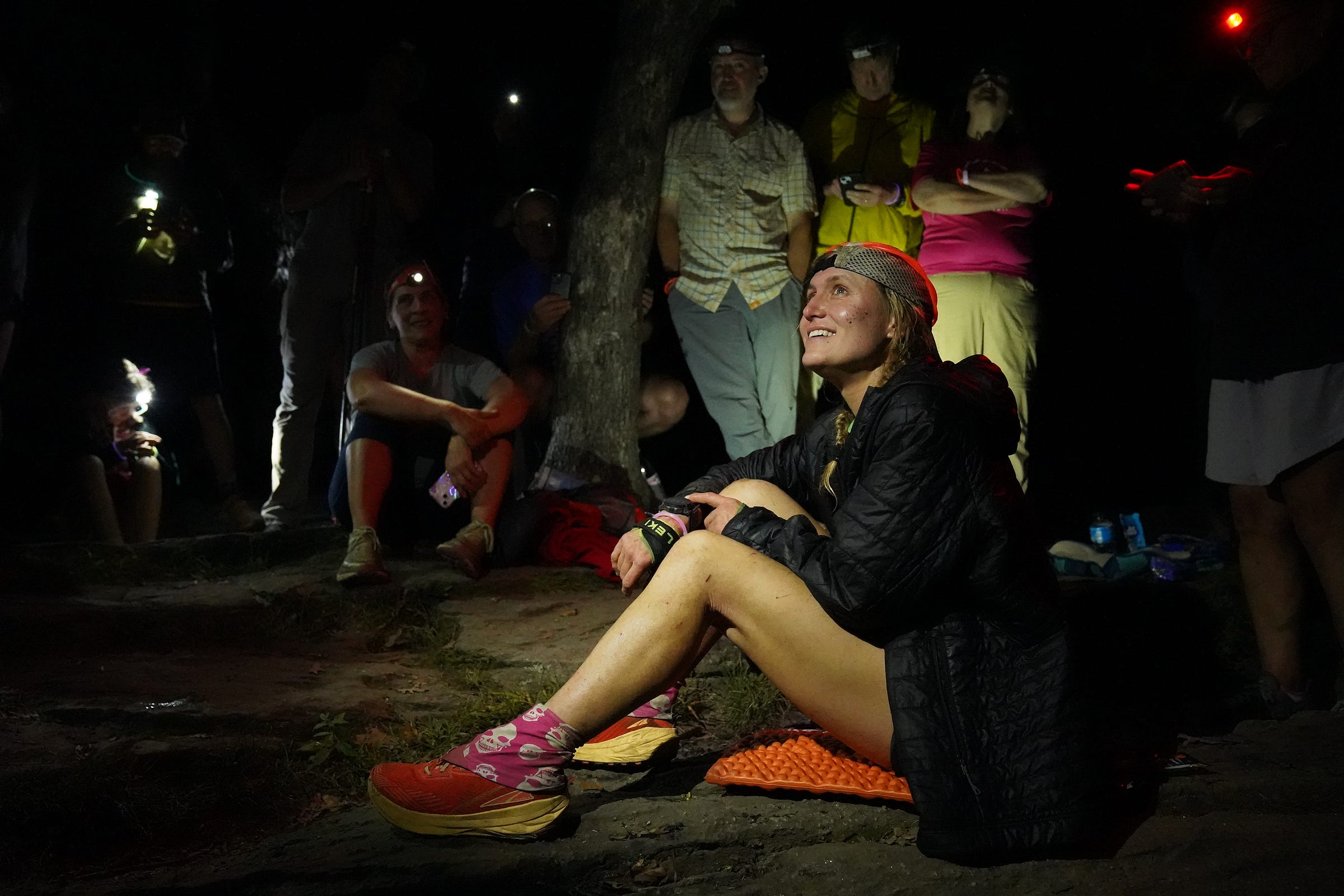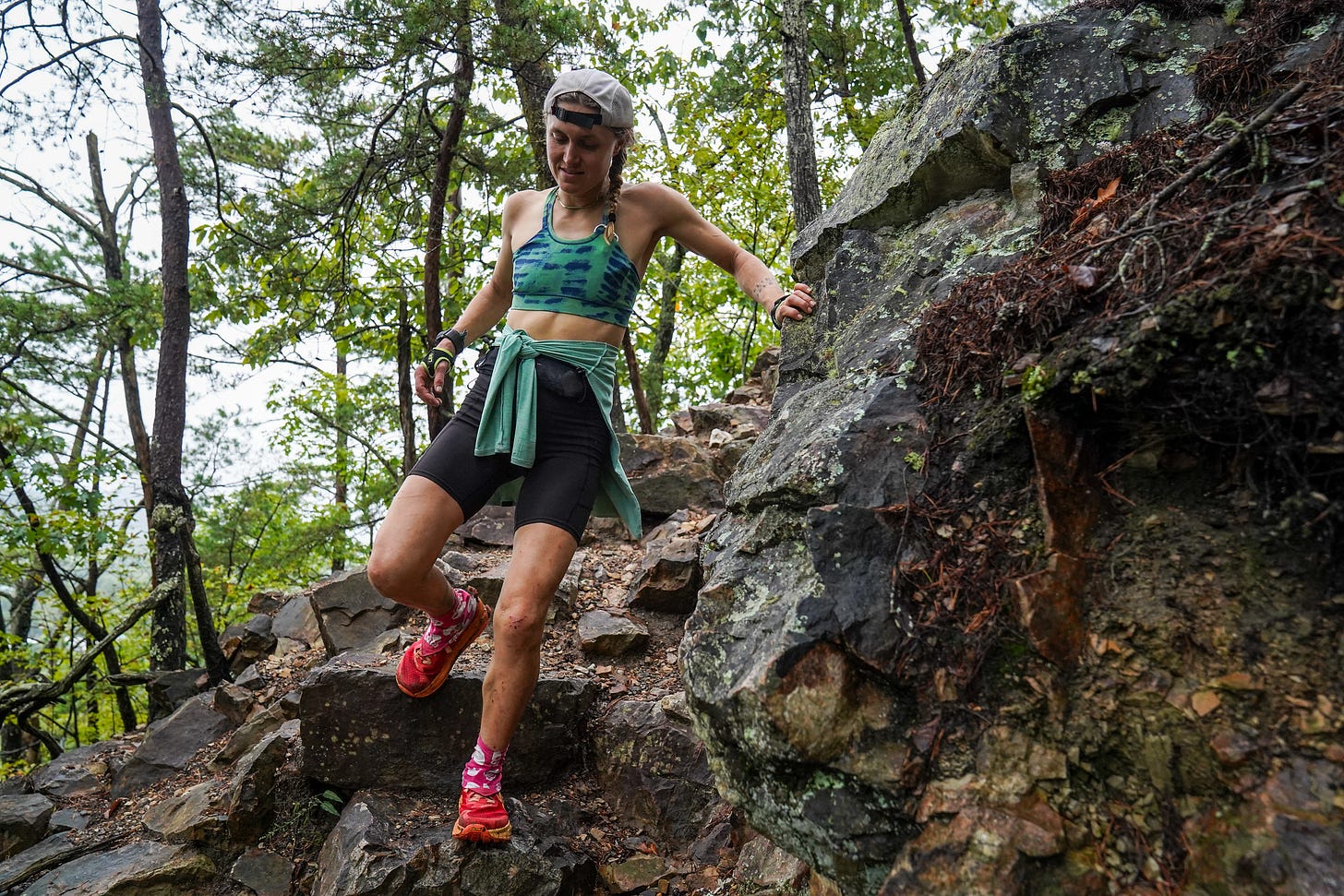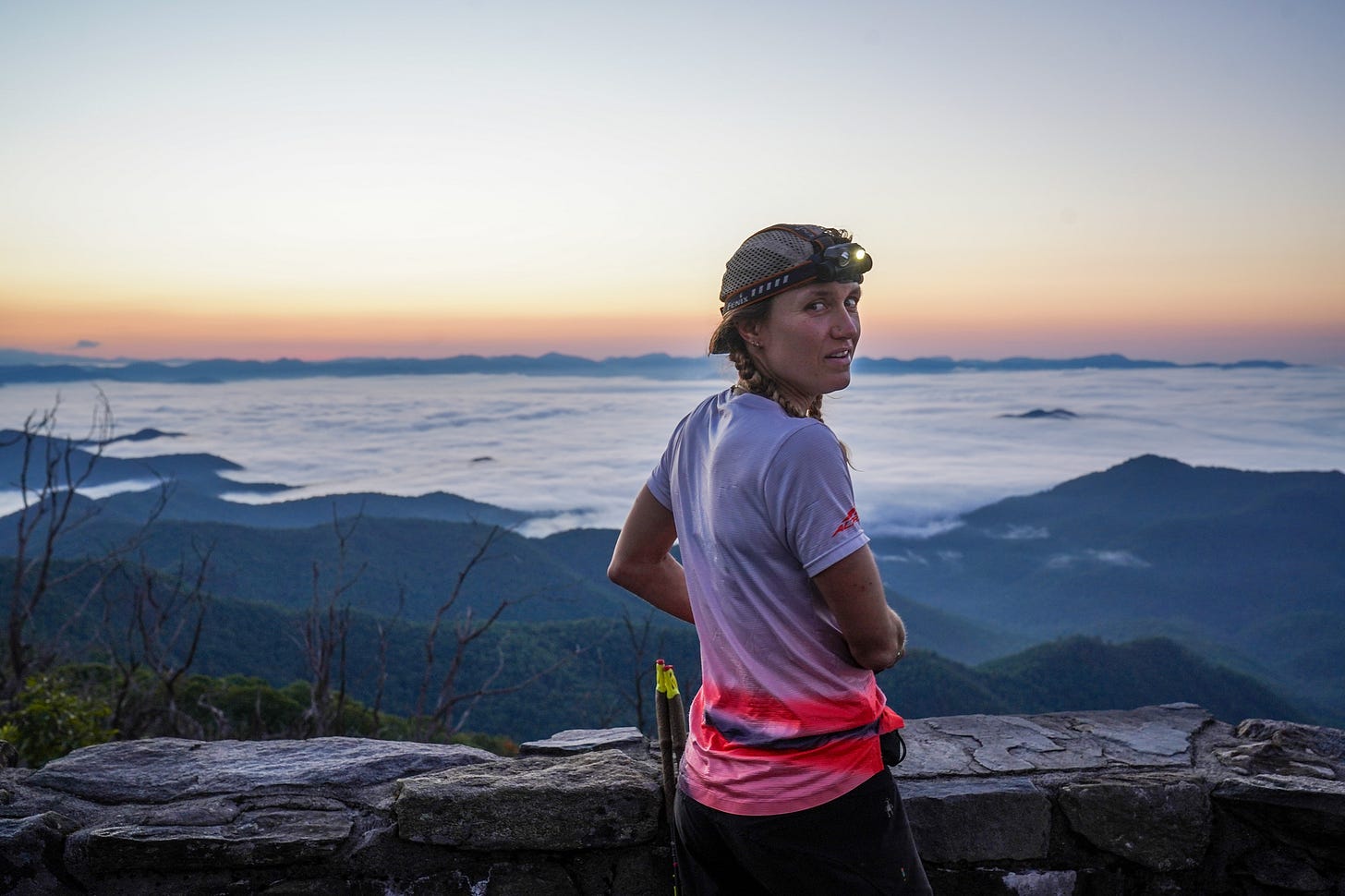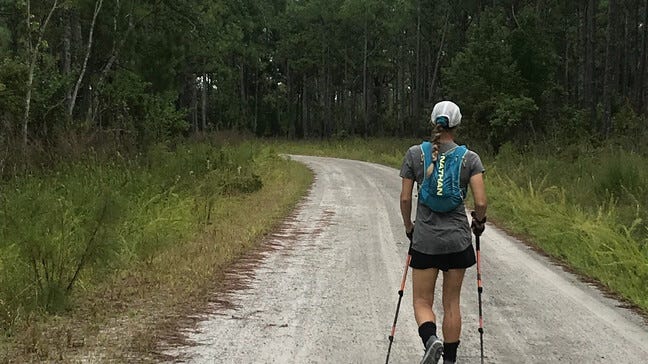How a woman from North Carolina set a record time on the Appalachian Trail
Tara Dower recorded the trail's Fastest Known Time by completing 2,197 miles in nearly 41 days. What put her on this path? A love of mountain running and a problem that arose during the pandemic.

I mean, holy shit:
One of the most grueling records in American endurance sports fell late Saturday night [on September 21st] in northern Georgia. Tara Dower, a 31-year-old ultrarunner and long-distance hiker born in North Carolina and based in Virginia, reached Georgia’s Springer Mountain, the southern terminus of the Appalachian Trail, at 11:53 P.M. She completed the arduous southern thru-hike of the iconic trail, crossing 14 states and 2,197 miles, in 40 days, 18 hours, and 5 minutes. It’s the fastest known time for hiking the iconic trail in either direction.
To put this in perspective, Tara averaged about 54 miles a day for almost six straight weeks. Also, this is the Appalachian Trail we’re talking about. The elevation gain is roughly the equivalent of climbing Mt. Everest 16 times (if you started at sea level, which you wouldn’t, but come on, just roll with me here). Anyhow, just to reiterate: This is nuts.
The paragraph I’m quoting above comes from Outside magazine’s thru-hiking expert (and former INDY Week music editor) Grayson Haver Currin, who wrote the first comprehensive story I’d seen about Tara’s achievement back on September 22. Since then, Tara’s gotten a lot of coverage, from Runner’s World to the Washington Post to “Good Morning America.”
I talked to Tara in late September, about a week after she finished. By then, she had come out of the brain fog that had set in on the trail, but her mind was still swirling from the attention and the non-stop interviews. She’d been preparing for this Fastest Known Time (or FKT) attempt for two years. “I don’t think I prepared properly for what came after,” she told me.
I was already familiar with Tara. I’d talked to her years ago before another FKT attempt on North Carolina’s Mountains-to-Sea Trail. Before all that, Tara had been a runner, but not an ultramarathoner. She’d done thru-hikes, but at normal speeds (where completion is measured in months, not weeks). She’d done hard things, but had not yet pushed up against the outer limits of human endurance. So how did she get here? Through failure, obstacles, and resilience, and a desire to keep moving, no matter what.
Tara Dower became obsessed with the Appalachian Trail in her dorm room at East Carolina University after she caught a National Geographic show about it. In 2014, she began to hike sections of the trail. A year after she graduated from ECU in 2016, she decided to thru-hike the whole thing. It didn’t go well. Eight days after leaving Springer Mountain in Georgia in April 2017, she woke up in her tent with chest pains and a migraine. She was breathing quickly. Her mind was racing. Later, a doctor would tell her that she had a panic attack. She decided then that she’d work through her anxiety, and the hiking would be a part of it.
Two years later, in March 2019, she left her job at the outdoors store in Greenville where she’d been working since graduation. She’d been saving her paychecks so she could hit the AT with her new husband Jonathan, who she’d known from their ECU days. He became her support system.
Megan Wilmarth met Tara along the trail in Pennsylvania. Before then, Megan was faster than most of the women that she’d met along the way. “I was hiking with guys, and getting sick of it,” she says. When Tara first appeared at a shelter asking for water, they didn’t really talk much. But Megan noticed that Tara’s group seemed to include more women than most, and they moved quickly. Tara and Megan began hiking with each other off-and-on through New Hampshire, and stuck together through the entirety of the trail in Maine. By then, they’d become close friends. “I had a slight gift of endurance,” Megan told me. “Not like Tara.”
(Megan’s trail name is “Rascal,” which is what most people call her on the trail. Tara’s is “Candy Mama.” She explained the name to me in our first interview. “The mom part is because I’m like a mom to everyone,” Tara said in 2020. “The candy part is kind of embarrassing because I just ate so much candy out there. Airheads were my favorite. I sometimes would forget to brush my teeth after eating them and go right to bed. When we ended, my dentist told me I had six cavities and I needed to stop eating Airheads, switch to chocolate, and start flossing. Otherwise I would not have any teeth left.”)
Tara, Rascal, Jonathan, and the rest of their group reached the northern end of the trail on Maine’s Mount Katahdin in September 2019. It took them five months and 10 days. A day later, she wrote down her thoughts in an Instagram post. “I feel the trail has been such an untouchable goal for me for so long that completing it didn’t seem possible,” she wrote. “Now it is done and I can move on. But to what?”
After some time living in Florida, Tara returned to a trail town to work. She’d read Jennifer Pharr Davis’s book “Becoming Odyssa: Adventures on the Appalachian Trail.” Davis herself had set the Fastest Known Time on the AT in 2011, finishing in 46 days. After that, she’d founded the Blue Ridge Hiking Company in Asheville to help other hikers with gear, guides, and more. Tara saw an opportunity, reached out, and landed a job as a caretaker at Davis’s Appalachian Trail hostel in Hot Springs in early 2020. She also guided hikes. Finally, she lived close enough to the trail to walk to it. “I’ve been meeting new friends lately who have asked where home is for me,” Tara wrote on Instagram. “The Trail is home.”
Everything seemed to be lining up perfectly. Then the pandemic hit.
Rascal, who lived in a van, came up to Hot Springs to quarantine with Tara, who had begun to do more than just hike the Appalachian Trail. She began to run on it.
Tara had been a runner since middle school. She’d gravitated toward distance, and had finished a few half marathons. But in June, she got a chance to run on the AT along Liz “Mercury” Anjos. Mercury was early in her attempt to break Jennifer Pharr Davis’s female speed record on the Appalachian Trail, and Tara helped to pace her for 35 miles over two days. “I had an intimate view of one of her hardest days on trail,” Dower wrote on Instagram. “Even with her shins throbbing, her mind exhausted, and entire body aching she insisted on positivity.”
The shin splints slowed her down, and Mercury finished in 51 days compared to Davis’s 46. Around this time, Tara got an idea of her own. She’d planned to complete a normal thru-hike of North Carolina’s Mountains-to-Sea Trail, which runs nearly 1,200 miles from Kuwohi (formerly Clingman’s Dome) on the Tennessee border all the way to the top of a sand dune on the Outer Banks. She’d planned to rely on the MST’s trail angels: volunteers who help thru-hikers along the way and give them rides, water, and places to stay in areas where campsites are scarce. But with the pandemic making it impossible to be in contact with people, Tara decided she needed to change her plans. “I ended up planning a faster hike,” she said. “I started asking around to find out how can we form a little bubble and just hike.”
Tara knew who could help. “She called me up and told me that she was going to do it, and asked if I would support her,” Rascal told me. “I said: I don’t know how to do that but sure, let’s give that a shot.”
They made a plan. Logistics. Mileage. Food. Water. They figured out that they’d need to average roughly 40 miles a day to set the record. “I really just wanted to see if this FKT thing is possible, and to see where my limits are,” Tara told me before her attempt in 2020. “Hopefully there’s not a point where I’m like, ‘Oh yeah, those are definitely my limits.’”
Tara planned to be on the trail for 30 days. She finished in 29 days, 8 hours, and 48 minutes, and set the trail’s Fastest Known Time.
The previous record holder on the MST (when it was some 250 miles shorter) was Diane Van Deren, who’d been an ultramarathoner. Tara herself started to get interested in longer and longer runs, and set a goal to run an ultramarathon herself in 2021. She also decided, like Rascal, that her home should be on wheels. A few months after she finished the MST, she bought a van, rebuilt the inside to include a place to cook and sleep, and in March 2021, she left Hot Springs for San Diego. That July, she ran her first ultra, a 52.6 mile race in southern California. Rascal came out to be her crew and support. Tara finished first in the female division, but it was rough. “I experienced some concerning issues during the race such as unpredictable bowel movements, vomiting … and hallucinating Jesus sprinting behind me to take my #2 spot,” she wrote after he race. Tara didn’t like the way her body reacted, but she wanted to keep competing.
After that, her life became a blur of thru-hikes, ultramarathons, and FKT attempts. She started competing in 100 mile races. She finished the John Muir Trail. In 2022, she set the FKT on the Benton MacKaye Trail, which starts at the same spot in Georgia as the AT and is named for that trail’s founder. “I didn’t feel great but I wasn’t totally exhausted,” Tara told me. “It made me think that AT was possible.” So Tara told Rascal that she wanted her help to break the record.
“I never had any doubts,” Rascal told me. “I had no clue how we were going to do it. I’ve structured the last year and a half of my life around the fact that I’m going to be done. I just thought I’m going to do something cool with my friend and make history.”
In the meantime, Dower’s rapid rise made her more and more popular in the ultramarathoning community. In 2023, Dower and Mercury teamed up for Dower’s successful FKT run on the Colorado Trail. And just 3 1/2 weeks before she hit the Appalachian Trail, Dower ran the Hardrock 100, one of the most punishing ultramarathons out there. Some people thought it might make her too worn out to pull off an FKT attempt. Dower thought it made her prepared.
And so with little fanfare, Tara Dower and her crew of friends and family stood on top of Mount Katahdin on August 12. At 5:47 a.m. she set off, headed toward Georgia.
She made it through Maine in six days. She reached Massachusetts by August 25. After 18 days, she’d put in more than 900 miles.

By then, Rascal realized that Tara wasn’t going fast enough. They were behind the pace set by the current record holder, Karel Sabbe of Belgium. “Once we got the numbers, we had to do what Tara calls nickel and diming,” Rascal told me. “We have to add one more mile a day. Then three more. One day I tricked her into 4-and-a-half more miles. She was not pleased!”
Rascal and her crew pushed Tara to go from 43-54 per day up to around 55-60. Dower wasn’t moving as quickly as Sabbe, but she was putting in longer days, which allowed her to cover more ground. On some days, she was moving for 19 hours.
By then, Tara’s crew had taken over nearly every aspect of her life. They planned her mileage. They dressed her. Paced her. They hand fed her food every half hour, and made sure she was consuming 10,000 calories a day. They squirted water in her mouth. They made sure she was on the trail and moving every morning at 3:30 a.m. They worked on her feet, which became progressively more gnarly. “My job was to move down the trail and to eat,” Tara told me. “I was the racecar. Rascal was the crew chief. She was the manager of chaos.” It was what Tara wanted, but it was hard to lose autonomy and the ability to make decisions. “I had a bathroom bag because, you know, ‘leave no trace,’” Tara told me. “People had to empty that. I didn’t have a lot of choices.”

“I always joke with her that she’s mentally unwell, and we have to keep her going. Be her shining light,” Rascal said. “I’m being her best friend. I know her pretty freaking well. I know she’s intimidated by large portions of food. If the sandwich looks too big, she’s not going to eat it. So you cut it into halves.”
“I cried,” Tara told me. “But I listened to Rascal because she was the boss.”
Tara was rarely alone. Someone was with her 80 to 85 percent of the time by Rascal’s estimate. But mentally, she felt lonely. After all, she was attempting something that had only done by a handful of people in the world, and even though her mom, Rascal, and the rest of the crew were taking care of her every need, it was hard to have someone to relate to. Tara had read books by previous FKT record holders. She’d listened to them on podcasts, and talked to them in person. She focused on positivity. But on the trail, she sometimes needed more than her crew could give her mentally. “In her really hard moments, she’d be crying,” said Rascal. “She’d say ‘You don’t understand what it’s like from my end.’ No, I don’t. I don’t think I will. Only five people in the whole world will understand it.” At one low point, Rascal cued up an audiobook version of Heather “Anish” Anderson’s book “Mud, Rock, and Blazes: Letting Go On The Appalachian Trail” a recollection of her record-setting unsupported trek of the AT (she finished in 54 days). Rascal scrolled through the book so Tara could listen to Anderson talk about the section of trail that she was currently on. “It was the only way Tara could find anyone to relate to her, even for ten minutes,” Rascal said.
Sleep deprivation was a real problem for both Tara and the crew. Often, Tara would take 90 second trail naps, where she’d stop, lay down, close her eyes for a minute-and-a-half, then get back up and keep going. Over the entirety of her time on the trail, she only took three showers. But the miles kept going, and the distance to the end kept getting shorter. (Coincidental side note: She ran through Damascus, Virginia on the same day that I was there with my family to ride down the Virginia Creeper Trail, but we missed each other by mere hours). Once she hit North Carolina, Liz “Mercury” Anjos came down and paced Tara on the same section of trail that Tara had run with her on back in 2020. She made it through Hot Springs, her former home.
Rascal was sure that Tara would break the record. Tara wasn’t so sure. So once she got to Tellico Gap, North Carolina, 129 miles from the end, Tara decided that she would forgo sleep almost entirely. She only closed her eyes for a total of 23 minutes. Once again, she started to see things. “I had an incredibly vivid hallucination of my friend Liz sitting on a stump looking at me. And I was like ‘oh hey Liz,’” she later told the Singletrack podcast. “Then I came to and I was like ‘oh crap, my mind is going.’”
It wasn’t until the sun had set on her last day that Tara finally felt relief. “I didn’t think it was possible that I was getting the record until three miles until the end,” she told me. She approached the summit of Springer Mountain, Georgia three minutes before midnight, dropped down to the ground, and pressed her face up against the plaque that marked the official southern terminus of the trail. She’d set the record, finishing a 2,197 mile journey in 40 days, 18 hours, and 5 minutes. She beat Sabbe’s record by 13 hours.
Immediately, people wanted to talk to Tara. She tried her best. Mentally, she really wasn’t able to speak as eloquently about the experience as she wanted. “Over the last two or three days of the attempt I deleted Instagram and Facebook,” she told me. “Then I downloaded them again and was inundated.” She hopes that she can be an inspiration for women and girls, and used the hike to bring in money for Girls on the Run, an organization founded by Charlottean Molly Barker. She’d planned on raising $20,000. She’s raised more than $50,000. She also keeps mentioning that even though her name is on the record, that her mom, Rascal, and the rest of the crew are really responsible for getting her there.
I talked to Tara on September 27, which was the same day that Hurricane Helene hit western North Carolina. In addition to the widespread devastation across the mountains, the storm washed out several sections of the AT, and dropped a lot of trees across its path. A lot of thru-hikers had to abandon their efforts, and it’s unclear what path next year’s thru-hikers would be able to take. Tara has raised money for a charity in Asheville by selling a prints that show a rendition of her hike. Tara had to delay the beginning of her FKT attempt by two days to allow Hurricane Debby to pass through Maine. Had she decided to start a week later, she likely would have had to stop just short of her goal.
Her mind is on western North Carolina, but she’s taken a little time to reflect on how she got to where she is, and where she’s going next. “Four years ago, I had plans to just regularly thru-hike the MST, and the pandemic changed everything,” she told me. “If COVID didn’t happen, what would [my life] look like? Would I just be a thru-hiker? Would I have found my way to ultramarathoning?”
She also misses the trail. “I kind of wish I was back there,” she said.

Tara, Rascal, and others from her crew are in a group chat and are throwing new ideas out there. This weekend, Rascal is running an ultramarathon in Arizona, and Tara is helping pace her. She feels some pain when she runs, but she’s back at it. That’s normal for ultramarathoners and people who attempt FKTs. They’re always pushing. “When we realize we haven’t found our limits yet, we keep pushing the boundaries,” Rascal said.
Tara knows there are more boundaries to push. “I cannot stop,” she told me. “I don’t know when to stop and just chill out. I find a lot of satisfaction to these challenges I put on my day. I pray for the day when I slow down, because when I don’t have a challenge, what would I do with my time?”






Friggin great stuff, as always! Well done, Jeremy!!
Thank you for sharing this story. Incredible